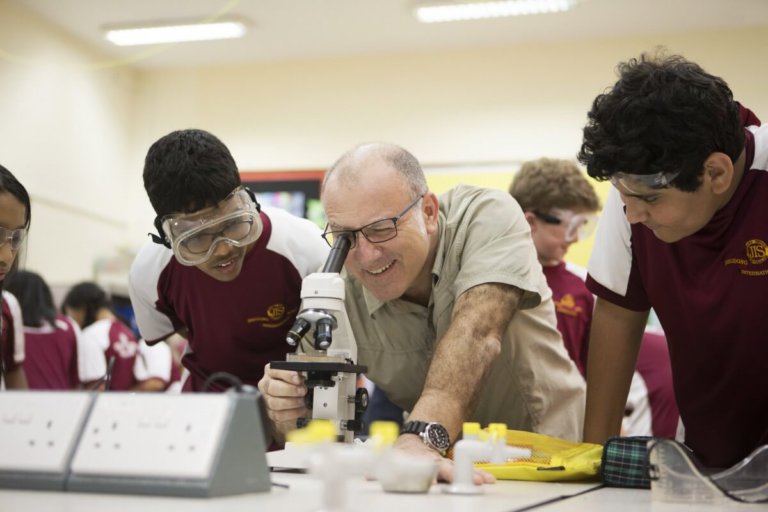
STEM (Science, Technology, Engineering and Mathematics) have been dominating the global education conversation, but this hardly comes as a surprise. As the world adapts to this new era of globalisation brought upon by the Fourth Industrial Revolution, big data analytics, robotics and artificial intelligence (AI) are the new norms shaking up how we live and work.
Over the next 10 to 20 years, the Organisation for Economic Co-operation and Development (OECD) estimates that “14 percent of jobs are at high risk of being fully automated, while another 32 percent at risk of significant change”.
This shows us that STEM will play an increasingly important role in the world of today and tomorrow. Future employees must be equipped with the knowledge and skills needed not only to adapt, but thrive in this unprecedented era.
Despite that, there seems to be a general decline in teens wishing to pursue STEM, according to a survey by Junior Achievement. They found that there have been “a significant drop in teenage boys who want a STEM career, down from 36 percent to 24 percent”, while “the low level of interest among teenage girls remained unchanged at 11 percent year-over-year”.

Source: Jerudong International School
In the face of such worrying downward trends, how are schools tackling the lack of interest among the youth?
Sparking an interest in STEM
Jerudong International School (JIS) prides itself on educating students who are passionate about the sciences. As one of South East Asia’s best boarding and day schools, JIS is unique in its surroundings of Borneo’s lush green rainforest. It offers a British and international curriculum to students between the ages of two and 18 who come from a whopping 55 countries, making the school a true melting pot of cultures.
One of the key things in sparking an interest in STEM among students is to expose them to the field in a non-intimidating way at a young age, granting opportunities for them to further cultivate their interests throughout their academic careers in school. For example, upon entering Nursery at the age of two, students are encouraged to develop a healthy curiosity of the world around them; to ask “Why?” rather than be a passive learner; as well as to refine critical thinking skills, all of which are crucial in developing students with the potential to succeed in STEM.

Source: Jerudong International School
Their ‘Outstanding’ Early Years Department uses the on campus Forest School, where students can explore nature in action. Meanwhile, future engineers exercise their creativity by playing with Lego, gain insights from class visits from medical professionals and role play and work together to nurture the seeds of future scientists.
From Year 4, Junior School students use a bespoke Science Laboratory while a Junior School Science specialist delivers lessons to Year 5 and 6 students where they investigate, observe, reason and consider what has happened and why. Their small class sizes help highly qualified, specialist science teachers facilitate this explorative and questioning approach, while their 27 well-resourced science laboratories are also a key factor in promoting science excellence.
Students also continue to develop and hone their interest and knowledge in science as they progress through senior school. For example, their Outdoor Discovery Centre – a student-led initiative to restore 10,000m2 of tropical heathland – is an initiative to investigate the rainforest on campus or explore the use of solar energy.
Cross-curricular links are also vitally important and emphasised at JIS. Subjects such as Physics come into play with Design and Technology lessons and Biology and Chemistry in Food Technology, as Middle Year students work out what’s happening when bread rises or cakes bake.
Recognising that students learn best when they’re passionate about a subject, JIS encourages them to select those they enjoy. For example, students in Year 12 and 13 have two choices: A-levels and the International Baccalaureate Diploma Programme (IB). The sciences are the most popular subjects in these pre-university courses across a range of nationalities.
Meanwhile, the IB Diploma cohort must participate in a Group 4 Project. At JIS, this not only includes the ‘pure’ sciences of Biology, Chemistry and Physics, but also Computer Science, Design and Technology and Environmental Systems and Societies. This project involves all the IB students working in small groups from their different science disciplines for a cross-subject investigative project.
This cumulative exposure to STEM has resulted in the school demonstrating high performance and interest in the sciences. Of the graduating students who will go on to study science subjects at university, almost 50 percent are female.
Unsurprisingly, JIS students have been making their mark. Last year, their senior students won the first EduBUILD Masters Hackathon competition hosted by EduTECH Asia 2018 exhibition in Singapore. Meanwhile, their Middle Years students created an award-winning video for COBIS, demonstrating Avogadro’s Principle about density as they asked teachers of different sizes to step into containers of water to see how much was displaced. JIS also organises Math Week to keeps students on their toes.Students are encouraged to explore science in the wider sense through participation in an extensive range of co-curricular activities. For example, Duke of Edinburgh Gold Award students may find themselves building greenhouses in northern India, while IGCSE students may be a key part of programming the sound and lighting or designing and building scenery in the school theatre.
JIS DoE Gold Award students are featured in this video from July 2018:
So, if you’re looking to embolden your child for future career success, JIS is the ideal starting point to chart their success.
Follow Jerudong International School on Facebook, Instagram, Twitter and YouTube
Liked this? Then you’ll love..
4 explorative international schools that value student innovation
How JIS Brunei enabled these students to enter the world’s elite universities







